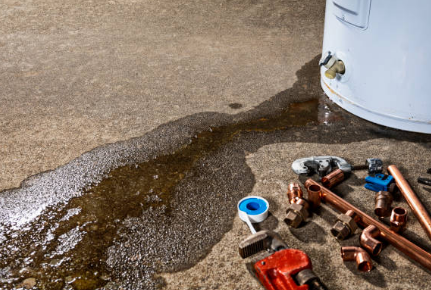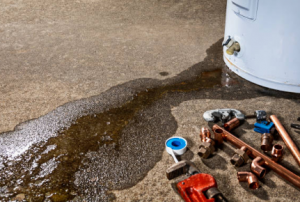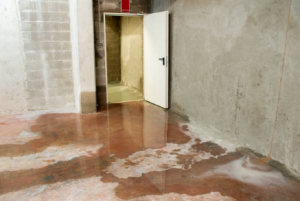The basement is always one of the most vulnerable areas of a home to water damage because it is underground. In most cases of basement water damage, the damage is caused by excess water that builds up in the soil surrounding the basement walls and finds its way inside. Excess water and moisture in the basement can cause damage to the foundational walls, flooring, basement ceiling, and other furnishings that will become more severe as the water spreads. Basement water damage also increases the risk of mold and mildew growth.
If you routinely experience water seepage in your basement, it is very important to take the necessary steps to stop the seepage. Even if your basement rarely leaks, it is still a good idea to take steps to protect your basement from water seepage and the damage and mold or mildew growth that it can cause. In this guide, we will discuss the main sources of water seepage in your basement as well as actions you can take to prevent basement water seepage. If your basement is affected by water damage, you should reach out to our professionals for water damage restoration.
What Causes Basement Water Seepage?
As mentioned above, excess water in the surrounding soil is usually the cause of water damage in the basement. However, there are several possible ways that this excess water can seep through the basement walls. The following are the most common causes of basement water seepage:
- Hydrostatic pressure: Hydrostatic pressure is the amount of pressure exerted by a fluid like water in a confined area. As more water builds up around the basement walls, the hydrostatic pressure increases which causes the water to force its way through new and existing cracks in the walls, gaps around pipes, and weakened parts of the wall.
- Expansive soil: Soil with a high concentration of clay will swell and expand as it absorbs more water. The expansion of the soil pushes against the foundation walls which causes water to seep into the basement.
- Frost heaving: The cold winter temperatures cause the soil to freeze. When this happens, the soil will either rise and settle when it thaws or push against the basement walls as it expands. Both results will put pressure on the basement walls which can lead to water seepage.
These conditions that occur outside the basement walls increase the risk of water seepage by putting pressure on the walls. When this happens, the excess water in the soil finds spaces where it can seep in. The following are the main areas where water finds its way into the basement:
- Cracks: Excess water can seep through cracks of any size in the basement walls. The seepage can also cause the cracks to expand which can lead to severe foundation damage.
- Space around the pipes: There are usually small gaps around the pipes that come into the basement through the walls. These gaps are typically sealed with hydraulic cement, but the cement can break down over time. Water can find its way into the basement through the gaps around the pipes if the hydraulic cement has weakened.
- Cove joints: Cove joints are the spaces where the basement walls and flooring meet. Excess water can find its way in through the cove joints if there is no drainage system to remove the water.
- Honeycombing: Honeycombing is when the aggregate within the concrete is exposed. Water can easily seep through honeycombing walls, footings, beams, slabs, and columns.
- Over the top seepage: This occurs when excess water seeps into the basement through the space between the top of your basement walls and the floor above the basement.
Understanding how basement seepage can happen and where the water may enter your basement will help you quickly find and address the problem and stop more water from coming inside. It is also important to take the proper steps to prevent basement seepage in the first place.
Tips to Prevent Basement Water Seepage
If your basement is regularly affected by water seepage, you can help prevent seepage with these tips:
- Reseal your basement:Water commonly seeps into the basement through cracks and openings in the foundation. If you suddenly experience water seepage when it rains when you didn’t before, there could be new cracks or deterioration in the basement walls or flooring. Look for and seal all cracks and openings to stop the water seepage.
- Adjust landscaping so water drains away from the home: Oversaturated soil is what causes basement seepage and if the landscape slopes towards the home, water will saturate the soil around the foundation and increase the risk of water seepage. It is important to make sure the landscape around your foundation slopes away from the home. A professional can help you adjust the landscaping in your yard.
- Clean and maintain gutters and downspouts: The gutters and downspouts also play a role in draining water away from your home. Clogged gutters will cause the water to spill over the side and pool near the foundation. Make sure your gutters and downspouts are free of debris and that your downspouts are long enough to drain water a safe distance from the foundation. If the downspouts drain the water too close to your home, replace them with longer downspouts.
- Install a vapor barrier: You can protect vulnerable basement walls by installing a vapor barrier. These barriers are polyethylene sheets that are 10-20 millimeters thick, and they cover basement walls to prevent seepage through cracks and other openings.
- Install an indoor or outdoor drainage system: If basement water seepage is a consistent problem, installing a drainage system inside or outside your basement can help. These systems collect excess water from outside the basement walls and under the basement flooring and ensure it is drained safely.
- Install a French drain outside: If water regularly pools in your yard after it rains, this water can eventually find its way into the basement. A French drain in your yard will collect pooling water and ensure that it is drained a safe distance from your home.
- Install a sump pump: Sump pumps are highly effective for preventing water seepage and basement flooding. The excess water is collected in a pit built into the basement floor and when the pit fills up, the sump pump ejects the water from the basement.
- Install a dehumidifier: Excess water and moisture in the basement isn’t only caused by leaks. Condensation may appear on the walls and ceilings if your basement is humid. If your basement is damp due to humidity, consider installing a dehumidifier to remove excess moisture from the air and prevent condensation. You can use a portable dehumidifier for smaller spaces in your basement and consider a dehumidifier that is integrated into your HVAC system for bigger basements.
- Install a backwater valve: Sewage backups are another potential cause of water in the basement, and they also create a dangerous situation as waste materials are brought in with the sewage water. Make sure you take the right steps to prevent sewer backups, including installing a backwater valve that prevents sewage from coming back into your home.
Call ServiceMaster S&R Systems for Basement Water Damage Cleanup
Basement water seepage is a common cause of water damage in homes, and it can lead to problems like severe structural damage and mold growth. By following the steps described above, you can help prevent water seepage in your basement as well as the damage and mold growth that comes with it. However, if you do still get water in your basement despite taking these steps, you can call our professionals at ServiceMaster S&R System for help.
We are a water damage restoration professional that can clean up and restore water damage in the basement. Our technicians use advanced water extraction and drying equipment to remove excess water and moisture and we can also restore the damage it caused. You can call us 24 hours a day at (630) 896-0030 for emergency basement water damage cleanup.



